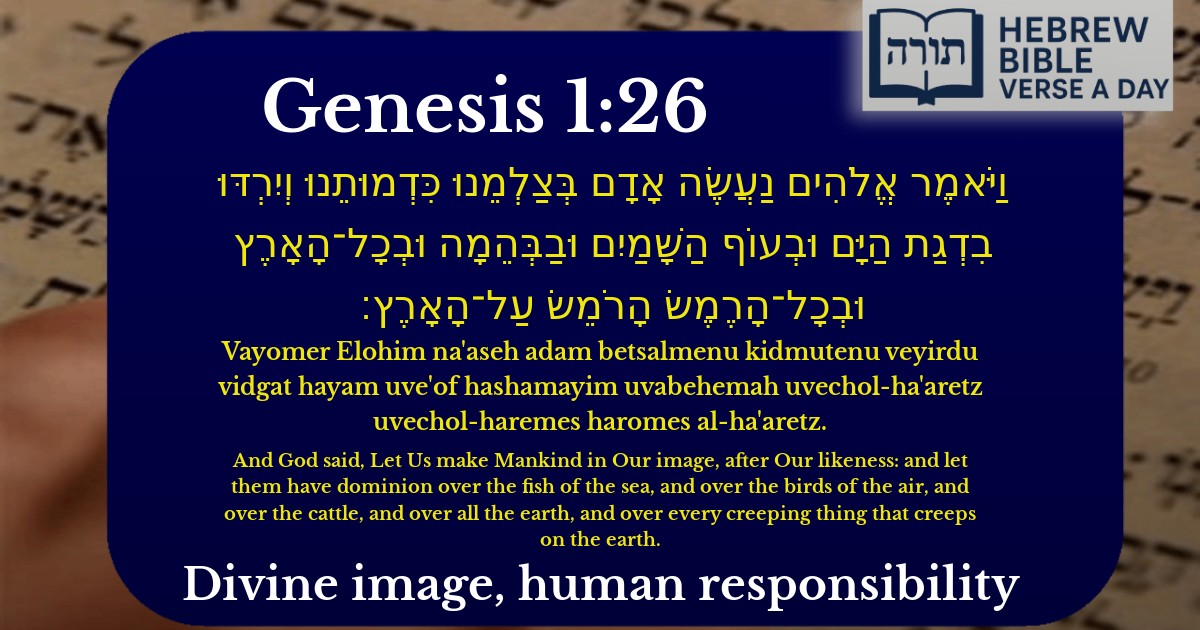Join Our Newsletter To Be Informed When New Videos Are Posted
Join the thousands of fellow Studends who rely on our videos to learn how to read the bible in Hebrew for free!
Hebrew Text
וַיֹּאמֶר אֱלֹהִים נַעֲשֶׂה אָדָם בְּצַלְמֵנוּ כִּדְמוּתֵנוּ וְיִרְדּוּ בִדְגַת הַיָּם וּבְעוֹף הַשָּׁמַיִם וּבַבְּהֵמָה וּבְכָל־הָאָרֶץ וּבְכָל־הָרֶמֶשׂ הָרֹמֵשׂ עַל־הָאָרֶץ׃
English Translation
And God said, Let Us make Mankind in Our image, after Our likeness: and let them have dominion over the fish of the sea, and over the birds of the air, and over the cattle, and over all the earth, and over every creeping thing that creeps on the earth.
Transliteration
Vayomer Elohim na'aseh adam betsalmenu kidmutenu veyirdu vidgat hayam uve'of hashamayim uvabehemah uvechol-ha'aretz uvechol-haremes haromes al-ha'aretz.
Hebrew Leining Text
וַיֹּ֣אמֶר אֱלֹהִ֔ים נַֽעֲשֶׂ֥ה אָדָ֛ם בְּצַלְמֵ֖נוּ כִּדְמוּתֵ֑נוּ וְיִרְדּוּ֩ בִדְגַ֨ת הַיָּ֜ם וּבְע֣וֹף הַשָּׁמַ֗יִם וּבַבְּהֵמָה֙ וּבְכׇל־הָאָ֔רֶץ וּבְכׇל־הָרֶ֖מֶשׂ הָֽרֹמֵ֥שׂ עַל־הָאָֽרֶץ׃
וַיֹּ֣אמֶר אֱלֹהִ֔ים נַֽעֲשֶׂ֥ה אָדָ֛ם בְּצַלְמֵ֖נוּ כִּדְמוּתֵ֑נוּ וְיִרְדּוּ֩ בִדְגַ֨ת הַיָּ֜ם וּבְע֣וֹף הַשָּׁמַ֗יִם וּבַבְּהֵמָה֙ וּבְכׇל־הָאָ֔רֶץ וּבְכׇל־הָרֶ֖מֶשׂ הָֽרֹמֵ֥שׂ עַל־הָאָֽרֶץ׃
🎵 Listen to leining
Parasha Commentary
📚 Talmud Citations
This verse is quoted in the Talmud.
📖 Sanhedrin 38a
The verse is discussed in the context of the creation of Adam, emphasizing the unique nature of human beings created in the divine image and their dominion over other creatures.
📖 Berakhot 61a
The verse is referenced in a discussion about the creation of man and woman, highlighting the plural form 'Let Us make' as indicating divine consultation with the heavenly court.
📖 Avodah Zarah 8a
The verse is mentioned in a discussion about the significance of Adam's creation and humanity's role in the world.


The Plural Language: "Let Us Make Man"
The phrase "נַעֲשֶׂה אָדָם" (Let Us make man) employs plural language, which raises questions about whom Hashem is addressing. Rashi (Bereshit 1:26) explains that Hashem consulted with the heavenly court (the angels) before creating man, teaching the principle of humility—that even the Almighty seeks counsel from lesser beings before making significant decisions. The Midrash (Bereshit Rabbah 8:4) further elaborates that this demonstrates the importance of deliberation and consultation in leadership.
"In Our Image, After Our Likeness"
The terms "בְּצַלְמֵנוּ כִּדְמוּתֵנוּ" (in Our image, after Our likeness) do not imply physical resemblance, as Hashem is incorporeal (Rambam, Yesodei HaTorah 1:7). Rather, as the Ramban (Bereshit 1:26) explains, this refers to the unique intellectual and spiritual capacity of man—the ability to reason, discern morality, and emulate Divine attributes (middot) such as kindness, justice, and mercy. The Sforno adds that this "image" grants man the potential to achieve wisdom and closeness to Hashem.
Dominion Over Creation
The verse grants mankind dominion over all creatures—fish, birds, animals, and creeping things. The Rambam (Moreh Nevuchim 3:13) teaches that this authority is not for exploitation but for stewardship, requiring ethical responsibility. The Talmud (Sanhedrin 38a) emphasizes that man's elevated status obligates him to recognize his Creator and use his intellect to sanctify the world. The Midrash (Kohelet Rabbah 7:13) warns that if man abuses this dominion, he degrades himself below the animals.
Key Lessons from the Verse